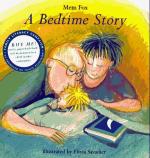|
This section contains 338 words (approx. 1 page at 400 words per page) |

|
Bedtime Story Summary & Study Guide Description
Bedtime Story Summary & Study Guide includes comprehensive information and analysis to help you understand the book. This study guide contains the following sections:
This detailed literature summary also contains Bibliography on Bedtime Story by George MacBeth.
"Bedtime Story" appears in the third section of George MacBeth's Collected Poems: 1958-1970. It consists of thirteen free-verse quatrains told from a narrator whose point of view is inconsistent. In the Foreword to this collection MacBeth writes that the poems in this section are "written for those who (like myself) regard themselves as children." While that may be so, MacBeth is no ordinary child. Poems such as "House for a Child," and "A Child's Garden" are grouped with poems such as "When I Am Dead" and "Fourteen Ways of Touching the Peter." Regarding oneself as a child, for MacBeth, means engaging in poetic mischief. "Bedtime Story" is a parody of bedtime stories, in that it uses the form of such a story to poke fun at the idea of happy endings and to undercut the notion that human beings are essentially good, or have generally benign intentions towards one another. One could imagine childrens' book author Maurice Sendak creating illustrations for the poem.
Speaking from a future, post-apocalyptic time, and recounting a story of the past, the poem's narrator describes an incident in the Congo between the "Mission Brigade" and its encounter with the "last man." MacBeth describes the incident in quasi-allegorical terms, implicitly criticizing the history of European colonialism and suggesting that human nature will never change: we will always trend towards self-destruction and remain blind to our own self-deception. The accidental death of the last human being parallels the deaths, both cultural and physical, of millions of Africans at the hands of colonial powers such as France and Great Britain. MacBeth seems to be saying that this has happened in the past and it will happen again. Although we put ourselves in the best possible light in the stories we tell about ourselves, the fact is that we deceive ourselves in doing so. The poem also echoes stories of the mythic wild child, that human being raised in the jungle away from the civilizing influences of society and his inevitable encounter with that society.
Read more from the Study Guide
|
This section contains 338 words (approx. 1 page at 400 words per page) |

|



